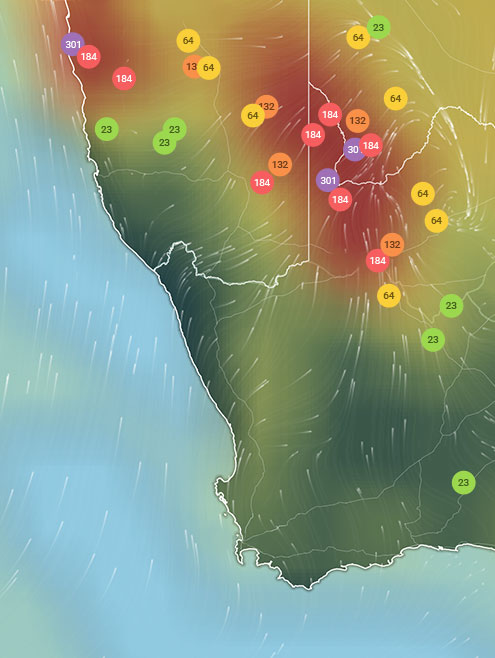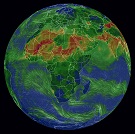Get a monitor and contributor to air quality data in your city.
8 people follow this city






AIR QUALITY DATA CONTRIBUTORS
Find out more about contributors and data sources| Weather | Scattered clouds |
| Temperature | 71.6°F |
| Humidity | 33% |
| Wind | 2.3 mp/h |
| Pressure | 29.9 Hg |
| # | city | US AQI |
|---|---|---|
| 1 | Karabuk, Karabuk | 142 |
| 2 | Mersin, Mersin | 129 |
| 3 | Kayseri, Kayseri | 116 |
| 4 | Antalya, Antalya | 112 |
| 5 | Adana, Adana | 104 |
| 6 | Kahramanmaras, Kahramanmaras | 86 |
| 7 | Dilovasi, Kocaeli | 74 |
| 8 | Corum, Corum | 73 |
| 9 | Izmit, Kocaeli | 72 |
| 10 | Konya, Konya | 72 |
(local time)
SEE WORLD AQI RANKING
| # | station | US AQI |
|---|---|---|
| 1 | Erzincan Merkez - Erzincan | 68 |
| 2 | Trafik | 49 |
(local time)
SEE WORLD AQI RANKINGUS AQI
59
live AQI index
Moderate
| Air pollution level | Air quality index | Main pollutant |
|---|---|---|
| Moderate | 59 US AQI | PM2.5 |
| Pollutants | Concentration | |
|---|---|---|
| PM2.5 | 15.7µg/m³ | |
| PM10 | 51.3µg/m³ | |
| O3 | 22.9µg/m³ | |
| NO2 | 31.8µg/m³ | |
| SO2 | 7µg/m³ | |
| CO | 342.2µg/m³ | |
PM2.5
x3.1
PM2.5 concentration in Erzincan is currently 3.1 times the WHO annual air quality guideline value
| Sensitive groups should reduce outdoor exercise | |
| Close your windows to avoid dirty outdoor air GET A MONITOR | |
| Sensitive groups should wear a mask outdoors GET A MASK | |
| Sensitive groups should run an air purifier GET AN AIR PURIFIER |
| Day | Pollution level | Weather | Temperature | Wind |
|---|---|---|---|---|
| Tuesday, Apr 16 | Moderate 57 AQI US | 69.8° 48.2° | ||
| Wednesday, Apr 17 | Moderate 60 AQI US | 73.4° 53.6° | ||
| Thursday, Apr 18 | Moderate 52 AQI US | 71.6° 53.6° | ||
| Today | Moderate 59 AQI US | 71.6° 55.4° | ||
| Saturday, Apr 20 | Good 45 AQI US | 71.6° 55.4° | ||
| Sunday, Apr 21 | Moderate 57 AQI US | 69.8° 53.6° | ||
| Monday, Apr 22 | Good 37 AQI US | 71.6° 53.6° | ||
| Tuesday, Apr 23 | Good 42 AQI US | 71.6° 51.8° | ||
| Wednesday, Apr 24 | Moderate 90 AQI US | 78.8° 57.2° | ||
| Thursday, Apr 25 | Unhealthy for sensitive groups 111 AQI US | 80.6° 64.4° |
Interested in hourly forecast? Get the app
Erzincan is the capital of Erzincan Province in Eastern Turkey. According to a 2012 census, Erzincan had an estimated population of approximately 96,500 and a total of 150,000 in the administrative district.
In the middle of 2021, Erzincan was experiencing a period of “Moderate” air quality with a US AQI reading of 62. This United States Air Quality Index number is an internationally used set of metrics supported by the World Health Organisation (WHO) and is used to compare different cities throughout the world using comparable standards. It is calculated by using the levels of the six most commonly found air pollutants. If records are not available for all six pollutants, then the figure is calculated by using what figures there are.
In the case of Erzincan, the only two figures available were for PM10 and PM2.5 which were 43.4 µg/m³ and 17.3 µg/m³, respectively. This level of PM2.5 is almost twice the acceptable figure as stated by the WHO of 10 µg/m³. With levels such as these, the advice is to close doors and windows to prevent the ingress of more polluted air. Those of a sensitive disposition are advised to remain indoors or if travel outside is unavoidable, then a good quality mask is recommended. The table published at the top of this page will help with the decision.
Air quality can be affected very easily by so many variables that its level can change very quickly. The speed and direction of the wind can alter the quality.
Looking back at the figures published by IQAir.com for 2020, it can be seen that the best air quality was from January until the end of October with the exception of February. For these 9 months, Erzincan had “Moderate” quality air with figures between 12.1 and 35.4 µg/m³. The spike that occurred in February pushed the air quality into the “Unhealthy for sensitive groups” category with a figure of 44 µg/m³. The same can be said for November when the figure there was 46.9 µg/m³. The remaining month of December saw the quality slip once again, this time into the “Unhealthy” category with a 58.5 µg/m³ reading.
There are no records before 2020 to make a comparison with so the 2020 figure was recorded as being 26.7 µg/m³. As this was the year of the COVID-19 pandemic, it cannot be seen as being truly accurate because many regulations were introduced to stop the pandemic which affected the general air quality. May private vehicles were no longer used as their drivers were furloughed and permitted to work from home. There were several industries that were told to cease production as their products were not classed as being essential.
With the arrival of the winter months, the burning of stoves in many houses and workplaces in Erzincan, despite the availability of natural gas, causes air pollution. Especially in the evening, the southern parts of the city are under the effect of smoke clouds. Citizens are complaining. Heating homes with wood and coal is a major cause of harmful pollutants.
Unfortunately, these emissions also increase during the winter months, when weather conditions often prevent pollutants from dispersing.
Satellite observations show that particulate matter in Turkey's atmosphere has always measured at higher levels compared to Europe in the last 15 years. In other words, Turkey's atmosphere is more polluted than Europe in terms of particulate matter, and this pollution has increased in 2018. The particulate matter in the European atmosphere has decreased by 14.2 per cent in the last 15 years, while it has increased by 8.4 per cent in Turkey.
Particulate matter (PM), nitrogen dioxide (NO2) and ground-level ozone (O3) are the pollutants that cause the greatest harm to human health and the environment in Europe. The main sources of these pollutants are road transport, residential heating, agriculture and industry. Road transport is often the main source of air pollution in cities where about three in four Europeans live. This is because cars, in particular, emit pollutants at ground level near people.
Air pollution is one of the world's common problems; all living beings are adversely affected directly or indirectly. Erzincan, depending on the overall quality of the coal used for heating in winter and adverse climatic factors, increase in air pollution began in the 2000s. The low plains of the city are subject to temperature inversion and, in particular reached the high value of the air pollution caused by heating in the winter. Erzincan fossil fuels for heating purposes (mainly coal) changes in air pollution parameters were examined in conjunction with the transition to the use of natural gas. Erzincan city centre; changes in air pollution and improvements in air quality with the advantages of using natural gas for heating purposes is based on the last 8 years. With the use of natural gas as a reduction in air pollution, sulphur dioxide (SO2) and PM10 values were determined as a significant reduction in disease compared to previous years.
Air pollution is the number one cause of premature death from environmental factors in Europe; but it also has important economic implications. Due to the deterioration of workers' health, it increases medical costs and reduces economic efficiency. Air pollution also damages soil, crops, forests, lakes and rivers. Pollutants even damage our homes, bridges and other built infrastructures.
Poor air quality has many negative effects on our comfort. Microscopic particles in polluted air can penetrate deep into the lungs. They irritate tissues, cause inflammation and worsen existing problems in our respiratory and circulatory systems. Exposure to these microscopic particles; Difficulty in breathing can increase the risk of serious diseases such as asthma, stroke, and heart attack. Young children and the elderly are the most vulnerable to the negative effects of these microscopic particles. Good indoor air quality both protects our health from these negative effects and increases our concentration, sleep and general quality of life.
1Contributor
Government Contributor
2 stations
1 Data source